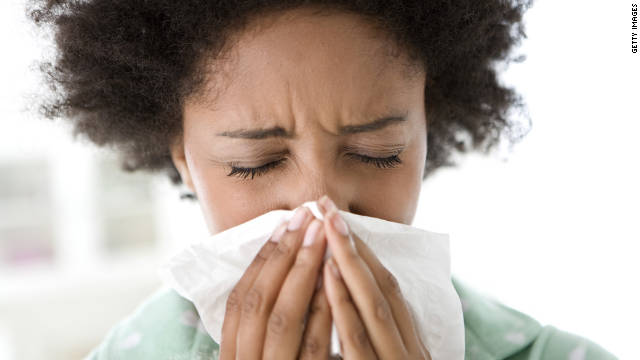Lewis
Member

(Health.com) -- Ever wonder why you always seem to come down with a life-interrupting virus this time of year, while other women you know sail through the season sniffle-, cough-, and ache-free?
We canvassed the research and talked to top experts to uncover these key, study-backed secrets for staying well, even when you're surrounded by germs.
The docs' #1 tip: Get the flu vaccine, ASAP. Then, follow these simple steps to boost your virus protection even more.
Secret #1: Make friends with fresh air
Common wisdom has it that staying indoors, where it's warm and toasty, is easier on your immune system than being outside in the cold. Problem is, being inside puts you in close constant contact with other people -- and their germs.
Adding insult to injury, you're already more vulnerable to illness now: Winter air is dry, whether you're indoors or out, so it pulls moisture from cough and sneeze droplets. That makes the drops lighter, so they -- and the cold and flu viruses inside them -- can hang around in the air longer. The arid air also dries out your nasal passages, creating cracks that viruses are all too happy to invade.
Not only does escaping into the fresh air give you a break from all those germs circulating inside, but going for a stroll can actually boost your immunity: A 2010
Appalachian State University study showed that people who walked briskly for 30 to 45 minutes a day five days a week during the winter had fewer illnesses than their sedentary counterparts.
"Exercise leads to an increase in natural killer cells, neutrophils, and monocytes, which ultimately increases immune function," says Ather Ali, N.D., M.P.H., assistant director of Complementary/Alternative Medicine Research at the Yale-Griffin Prevention Research Center.
Secret #2: Relaxation fights off colds (Yes, really)
We know, we know -- you're heading into the holidays, your kids are home from school, you've got family and work craziness, and your schedule is packed with parties and shopping marathons. There are a trillion reasons why taking time to chill out might be the last item on your to-do list. But here's why it should be a priority: "Being stressed will increase your susceptibility to catching a cold," says Ali.
That may be because, over the long term, it leads to the ongoing release of stress hormones, such as glucocorticoids. These impede your body's ability to produce cell-signaling molecules called cytokines, which trigger a disease-fighting response from your immune system.
"You're also less likely to take care of yourself -- get ample sleep, eat right, exercise -- when you're stressed," says Ali, which is crucial to upping your immunity (see secrets #1 and #4!).
Secret #3: Clean hands are everything
Cold and flu can spread all too easily through touch -- especially after you handle hard surfaces like tables and doorknobs, where viruses can survive for two to eight hours. Keep your fingers away from your eyes, nose, and mouth as much as possible, and make sure to master the art of hand-washing.
Soap and water remain your most effective tools there, according to the Centers for Disease Control and Prevention. Germs can grow on bar soaps (ew!), so use the pumped kind -- or better yet, a hands-free dispenser. Choose regular soap over antibacterial (the overuse of which may contribute to the development of antibiotic-resistant germs).
Lather for a solid 20 seconds before rinsing, and make sure to dry thoroughly (but not on your germy clothes!): "Damp hands are far more likely to spread bacteria than dry ones," says Dana Simpler, M.D., a primary care physician at Mercy Medical Center in Baltimore.
When you're on the go, alcohol-based hand wipes or sanitizers are good alternatives. To further reduce the spread of germs, cough or sneeze into a tissue or the crook of your elbow -- not your hands -- and if you forget, go lather up (or crack open the sanitizer gel): A 2010 American Cleaning Institute survey found that fewer than 40% of us wash our hands after coughing or sneezing, meaning we're putting our viruses back out there for others to catch.
Secret #4: The magic bullet? Sleep
An occasional restless night is nothing to worry about, but a continuous lack of zzz's can hamper your immune system's ability to function, not to mention increase your risk of all sorts of health problems, including diabetes, heart disease, obesity, and depression.
Though experts often say that sleep requirements vary by individual, a 2009 Carnegie Mellon study found that anything short of seven hours nearly triples your odds of catching a cold -- and that means seven straight hours, with no middle-of-the-night wake-ups.
"For many of us, the only quiet time we have to think through things is when we're lying down at bedtime. Unfortunately, problem-solving in bed interferes with sleep," says Leslie Swanson, Ph.D., a sleep specialist at the department of psychiatry at the University of Michigan, Ann Arbor.
Instead of taking your troubles to the mattress with you, spend a few minutes before you turn in to jot down your concerns or pressing to-do's in a journal. Still tossing and turning? Go to another room and write some more, getting back in bed only when you're sleepy again, so you don't associate your bed with being wide awake.
Or, try this relaxation technique: Starting at your toes, tense your muscles as tight as you can, hold for a few seconds, and then relax. Continue tensing and relaxing muscle groups as you move all the way up your body to your head. Then sleep soundly, knowing you'll wake up better equipped to fight off colds.
CNN






 :p
:p